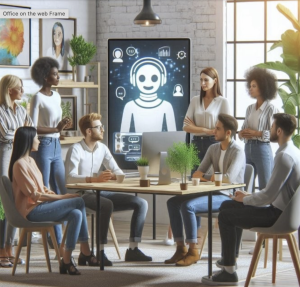March 2025 Briefs
First Quarter Education Updates and Farewell to Tris
Earlier this month, we gathered outside Boston, Massachusetts for the first Think Tank and Forum of 2025. Thank you to HERO Senior Research Fellow Dr. Sara Johnson for creating a Think Tank that explored the business case, policies, practices, and innovative solutions to address disparities in women’s health. HERO members will find the Think Tank slides and recordings in the HERO Hub. Read on for details on the next Think Tank.
Thank you, also, to HERO Research Fellow Dr. Colleen Saringer for curating a day-long Forum highlighting success stories and lessons learned from the workplace policies, environmental supports, culture, and climate initiatives that have been shown to improve the mental health of employees. Colleen started the day with her “Why” and modeled the type of vulnerability needed from leaders and organizations striving to make lasting systemic change.
HERO welcomes two new Education Fellows this month. Dr. Wendy Lynch and MJ Shaar have joined the team to lead on Think Tank and Forum convenings later this year.

Karen Moseley recognized Tris Rohner’s service on March 11 with a crystal heart and a resolution from the HERO Board of Directors.
Lastly, we are preparing to bid farewell to Pat “Tris” Rohner, who is retiring on March 31, after more than 25 years of dedicated service to HERO. Throughout her tenure, Tris has done every job, contributing significantly to our growth and evolution. Her willingness to tackle any task, no matter the size, and her innovative ideas have consistently brought new energy to HERO events. We deeply appreciate her unwavering commitment to our members and sponsors.
You can help us celebrate Tris’ remarkable career and contributions to HERO with a video, audio, or written message here: https://www.kudoboard.com/boards/mFb2Vo4i
Welcome Spring and Second Quarter!
With gratitude,
Karen
P.S. If you’re looking for a book recommendation, consider The Women by Kristin Hannah. This historical fiction novel highlights the role of the female nurses in Vietnam and the impact of the war on their mental health when they returned home.
Member Updates
HERO Committees
What’s new with HERO Committees?
Interested in staying ahead of industry trends, contributing to published reports, and building strong connections with fellow professionals? HERO members are encouraged to participate in one or more committees for the additional value accrued in the people you meet, the insights you gain, and the ability to contribute to published articles, white papers, case studies, webinars and other tools.
Here’s the latest update on our current committee activities:
- People & Culture Study Committee: This committee will convene in April to discuss new opportunities to expand on the work published last year, Investing in People and Culture. We anticipate one or two workstreams with light-lift, short-term deliverables.
- Policy Committee: Historically, the Policy Committee has engaged when there is an opportunity to provide research and education for public policymakers. We have a new opportunity! We are polling HERO members on the extent to which their organization prioritizes government affairs in its efforts to improve workforce health and well-being. Results from that poll will guide the committee agenda.
As a HERO member, you can join a committee today! If you are interested in learning more or joining a committee, please contact Karen Moseley at Karen.Moseley@hero-health.org.
If you want to learn more or join a committee, please contact Karen.Moseley@hero-health.org.
HERO Think Tank

AI is revolutionizing industries, including human resources and mental health care. While tools like AI-driven platforms promise enhanced efficiency, tailored support, and reduced barriers to care, they also pose risks to privacy, empathy, and equity. Employers play a pivotal role in building the guardrails needed to harness AI’s benefits while protecting against its pitfalls.
HERO Senior Fellow Dr. Paul Terry has designed this opportunity to engage in dynamic discussions and explore innovative approaches for integrating AI into workplace health strategies. Attendees will delve into cutting-edge applications, including:
- AI tools for mental health support, from virtual therapy to personalized wellness plans.
- Algorithms designed to detect early signs of stress, anxiety, or depression.
- Platforms that streamline access to care and match individuals with the right resources.
AI Think Tank Highlights:
- Expert Presentations: Learn from AI and health leaders about groundbreaking innovations and best practices.
- Group Discussions: Collaborate with peers to tackle critical questions, such as:
- How can AI-driven solutions reduce disparities in access to mental health care?
- What ethical considerations should guide the development of AI tools?
- How can employers ensure AI enhances, rather than detracts from, employee well-being?
- Real-World Case Studies: Discover how leading organizations are scaling AI-driven mental health services while maintaining quality and empathy.
Discussion Topics Include:
- Balancing automation with humanity: How can AI support, rather than replace, meaningful connections?
- Guardrails for ethical AI use: Ensuring accuracy, fairness, and emotional intelligence.
- AI’s role in addressing workforce challenges like burnout, stress, and hybrid team dynamics.
Takeaways for Attendees:
- Actionable strategies for integrating AI into workplace wellness programs.
- Insights into ethical AI implementation to mitigate risks and enhance benefits.
- A deeper understanding of the employer’s role in shaping AI’s future for positive and sustainable outcomes.
HERO think tanks are a benefit of membership. HERO member organizations are allowed three representatives for this virtual think tank.
Webinars
Unseen Challenges: How Chronic Conditions Impact the Workplace and Ways Employers Can Offer Support
May 6, at 1:00 PM EDT
Host: Dr. Paul Terry, HERO Senior Fellow
Speakers:

Millions of workers are managing conditions like diabetes, hypertension, heart disease, and asthma, often without the support they need. A new national poll by Harvard T.H. Chan School of Public Health and the de Beaumont Foundation assesses the impact of chronic health conditions in the workplace, highlighting the toll chronic conditions have on both employers and employees. The poll, conducted among a national sample of U.S. employees, found that three-fourths (76%) of those with chronic conditions need to manage their conditions during work hours. Yet a majority (60%) have not formally disclosed their conditions to their employer. Further, one-third of all employees (33%) say they have helped family members with their chronic conditions in the past year, and nearly half of those helping family members (45%) frequently
needed to do so during working hours.
While employees struggle in silence, productivity drops, absenteeism rises, and health care costs climb. But without visibility into how your employees — and your business — are affected, you may be missing opportunities to provide support. This webinar will provide an in-depth presentation of the poll’s findings along with a discussion of opportunities for employers to better support employees who are managing their own or their family’s chronic conditions.
HERO Scorecard
Since the launch of the Brain Health Best Practice Score last year, HERO continues to explore with the Business Collaborative for Brain Health to research gaps and ways to advance brain health for employers.
From our Brain Health Partner:
The Brain House’s recent success at Davos marked a pivotal moment in global health, as brain health emerged as a top priority for leaders and innovators worldwide. At the World Economic Forum, experts discussed the transformative potential of the brain economy, emphasizing the need for strategic investment and collaborative solutions to improve mental and neurological well-being. Forbes recently highlighted this shift, stating that brain health has become a critical focus at Davos (Forbes Article). The Brain House was established by the Davos Alzheimer’s Collaborative in partnership with many organizations, including the UsAgainstAlzheimer’s Business Collaborative for Brain Health, of which HERO is a member. For more highlights, see Health Policy Watch and Forbes.
Building on this momentum, the upcoming Houston Roundtable will convene business and policy leaders to develop actionable strategies for advancing brain health on both a national and global scale. HERO will be there, and HERO members are invited to attend this convening, and can register here: https://businessforbrainhealth.org/braineconomyhouston
Member Benefit Highlight
HERO offers a webinar series, with a new webinar most every month. While some webinars are open to the public, others are members only. In addition to the live monthly webinar, all recordings are available to members, only in the HERO Resources Area, in the HERO Hub.
HERO Hub Updates: New Content
HERO Hub Learning Series
This month’s featured topic is “Leadership”. Here are just two of the 34 (and growing) resources on this topic available in the HERO Hub’s Resource Center, including newly added presentations from the 2025 HERO Forum I. Log in required.
Leadership & Systemic Change for Workforce Mental Health 
Mental health in the workplace requires more than standalone programs—it demands a systemic shift in culture, leadership engagement, and sustained commitment. In this discussion, we will explore how organizations can embed mental well-being into their culture, from early awareness efforts to comprehensive strategies. Additionally, we will examine the critical role of workplace change and its impact on employee mental health, highlighting how different types of change—such as organizational restructuring—can shape well-being outcomes. Attendees will gain insights into effectively advocating for mental health initiatives, tailoring interventions to support employees during transitions, and avoiding “carewashing” in times of uncertainty. Through real-world examples and lessons from global programs, this session will equip leaders with actionable strategies to foster resilient, supportive workplace environments where employees can thrive.
A Data-Driven Approach to Tracking and Communicating Belonginess Among University Employees ![]()
Research suggests that belonging, and its related constructs such as social determinants of health and health culture, has a strong association with health and wellness. Brought to the forefront by the COVID 19 pandemic, it has become apparent that employees thrive when their sense of belonging is optimal. As a result, measuring and understanding belongingness and its related constructs, among employees, can benefit organizations. In this session, the University of Michigan and Truven by Merative will share lessons learned from the development of dashboards and peer-reviewed research. More specifically, the team will outline measures to collect, analyze, visualize, and communicate belongingness and how this concept fits into an overall view of social determinants of health and health culture.
HERO RECOMMENDS
Resources and Readings
Recommended Resources
- Dr. Nico Pronk was recently recognized as a Twin Cities “Notable Health Care Leader.” Nico is a former HERO Board member, a winner of HERO’s Mark Dundon Research Award and a frequent contributor to HERO learning events. Congratulations, Nico!
- Building a culture of healthy living in the workplace, available online in Progress in Cardiovascular Diseases. Nico Pronk joins with HERO member and advisor Laurie Whitsel, HERO Research Fellow Mary Imboden, and others to publish this review article on culture of health definitions, factors, development, and business case.
In preparation for our next Think Tank…
- AI and Acknowledgements. When we use artificial intelligence bots to support our work, how should we share the credit? HERO Senior Fellow Paul Terry examines the use of AI in science writing. “I used AI in drafting this editorial.” The article is open access in the American Journal of Health Promotion.
- AI, Belonging & Connection. HERO Fellow Wendy Lynch has been engaging the “AI companions” from sesame ai. They offer a male and a female companion who will have very realistic, comforting, encouraging conversations with you.
In preparation for our next Forum…
- Chancellor, J., Margolis, S., Jacobs Bao, K., & Lyubomirsky, S. (2018). Everyday prosociality in the workplace: The reinforcing benefits of giving, getting, and glimpsing. Emotion, 18(4), 507–517. https://doi.org/10.1037/emo0000321
- Addressing the Rise of Incivility: A Town Hall Event. April 22nd, 3:30 – 5:00 PM EDT. Join the American Public Health Association, American Psychological Association, International City/County Management Association (ICMA), and the National League of Cities (NLC) for an insightful conversation on the impact of incivility on public servants, including city managers, health professionals, and elected officials.
- HBR: 5 Pandemic-Era Lessons on Leading Through Drastic Change. Ringel and Solomon discuss the leadership imperatives required to effectively maneuver change and maintain organizational stability in the post-Covid era.
Public Policy Priorities:
- From American Benefits Council (including research from HERO). Led by Tami Simon, who chaired the ABC task force for this initiative and also serves as secretary of the HERO Board.
- From Foundation for Social Connection (including a section on workforce/employers)
- A growing number of organizations are identifying evidence-based frameworks to provide guidance to health promotion professionals and organizations seeking to increase social connection and belonging inside and outside of work. HERO Senior Fellow Jessica Grossmeier offers thoughtful summaries and critiques of five books highly relevant to health promotion professionals. The article is open access in the American Journal of Health Promotion.
Books:
- Why Are We Here? Creating a Work Culture Everyone Wants, by Jennifer Moss. From the author of The Burnout Epidemic, this book explores the evolution of our relationship with work and provides a guide for leaders.
- Likable Badass: How Women Get the Success They Deserve, by Alison Fragale. A recommendation in the spirit of Women’s History Month, Fragale weaves behavioral science and impactful stories for women and their allies.
